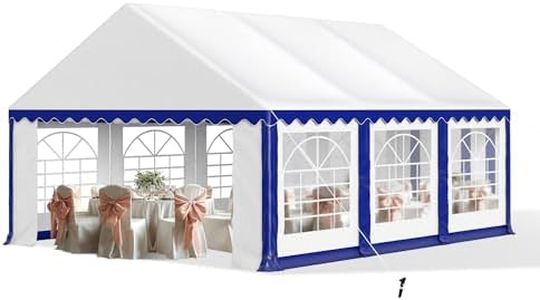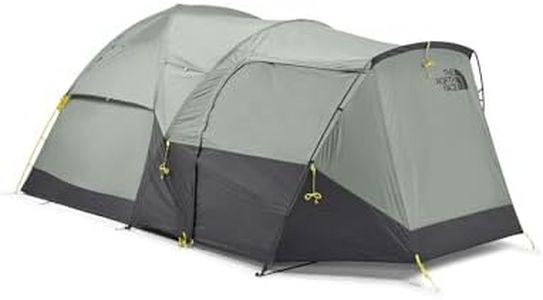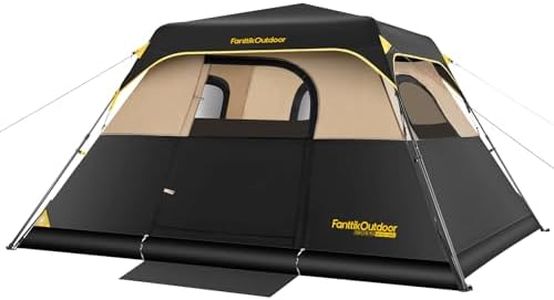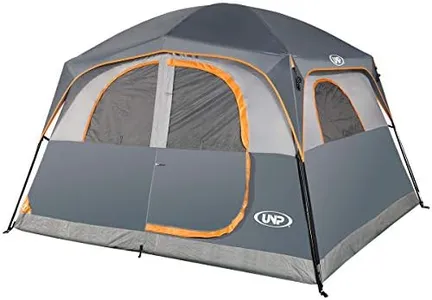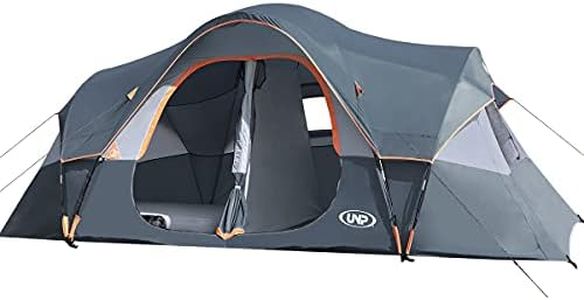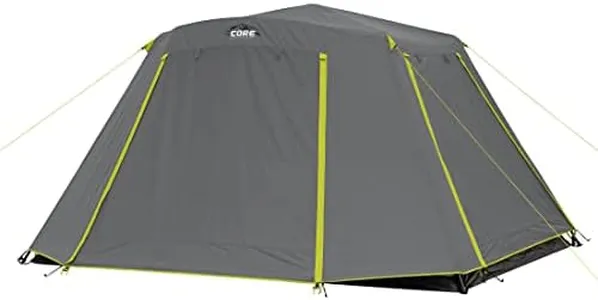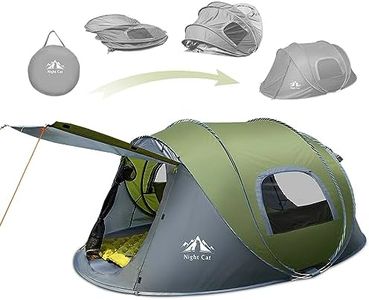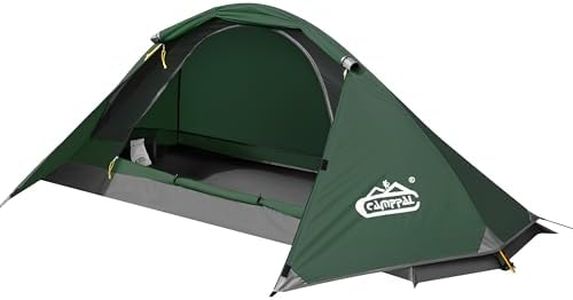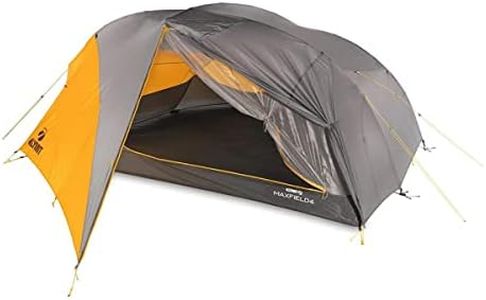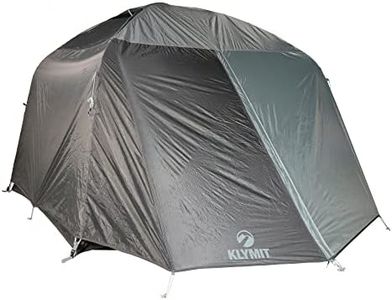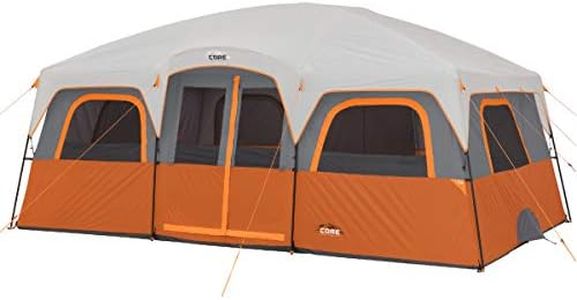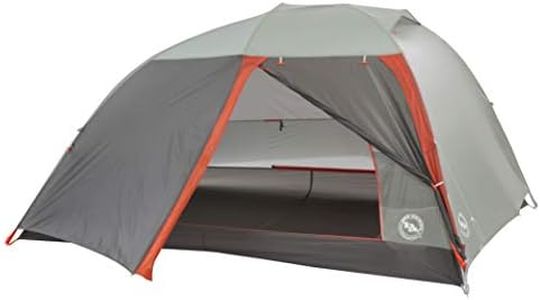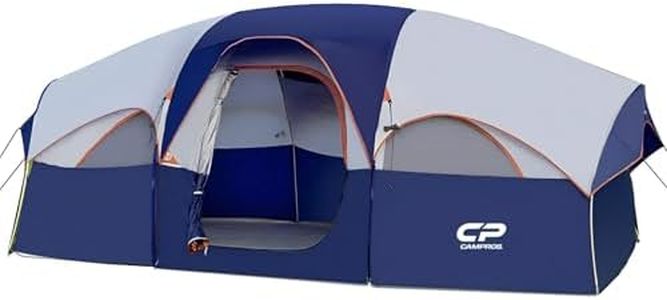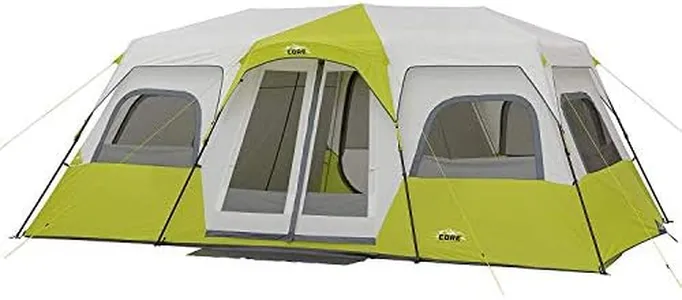10 Best Tents 2026 in the United States
Our technology thoroughly searches through the online shopping world, reviewing hundreds of sites. We then process and analyze this information, updating in real-time to bring you the latest top-rated products. This way, you always get the best and most current options available.

Our Top Picks
Winner
The North Face Wawona 6 Tent | Six-Person Camping Tent, Water Repellent, Spacious & Easy to Set Up, Attached Vestibule Area, Agave Green/Asphalt Grey, One Size
Most important from
26 reviews
The North Face Wawona 6 is a spacious six-person tent designed mainly for casual camping in mild weather, given that it’s rated for 2 seasons. Its standout feature is the large interior height, which lets you comfortably stand or sit inside, making it feel more like a cozy retreat than a traditional tent. The included large vestibule adds valuable space for storing gear or extra seating, which is great for families or groups. Ventilation is solid thanks to a big mesh front door, helping reduce condensation and keep air flowing.
Setup is straightforward with color-coded poles and a lightweight yet strong aluminum frame, so you won’t struggle even if you’re new to pitching tents. Weighing around 19 pounds, it’s not the lightest option, so it’s better suited for car camping rather than backpacking. Its water resistance relies on a Durable Water Repellent (DWR) coating rather than a fully waterproof design, so it can handle light rain but may not be ideal in heavy, prolonged storms. Interior pockets and ceiling storage add practical touches for organizing small items.
With just a 2-season rating and no flame-retardant coating, you’d want to avoid harsh weather or open flames nearby. The Wawona 6 delivers excellent space, comfort, and easy setup, making it a solid choice for family or group camping in mild conditions, but it’s less suited for rough weather or trekking adventures.
Most important from
26 reviews
FanttikOutdoor Zeta C6 Pro Camping Tent 6 Person Instant Cabin Tent Setup in 60 Seconds with Rainfly & Windproof Portable with Carry Bag for Family Camping & Hiking, Khaki
Most important from
922 reviews
The FanttikOutdoor Zeta C6 Pro is a 6-person cabin-style tent designed with convenience in mind, especially for families or groups. Its standout feature is the super-fast setup—thanks to pre-installed poles, you can pitch it in about 60 seconds, which is great if you’re new to camping or want to spend less time setting up. The tent is made from durable polyester with a strong carbon steel frame, making it sturdy yet relatively lightweight at 16.8 pounds for its size. At 120 by 108 inches and 66 inches high, it offers enough space for six people and even fits a queen-size air mattress comfortably, with room to stand up inside.
Ventilation is well thought out, with mesh windows on all sides plus ceiling and floor vents to keep air flowing and reduce condensation, which is helpful for warm weather camping. It also has a mesh ceiling panel to enjoy the stars at night. Weather protection is solid for a 3-season tent—its fabric has a 2000mm waterproof rating, and the rainfly along with adjustable ropes and stakes help keep it stable and dry in windy or rainy conditions. However, as a 3-season tent, it’s not designed for harsh winter weather or heavy snow.
The tent includes useful features like a power cord entrance and interior mesh pockets for storage. Some users might find the 16.8-pound weight a bit heavy if they need to carry it long distances during hiking trips. Also, the single-room layout means less privacy if camping with multiple families or groups. The FanttikOutdoor Zeta C6 Pro offers a spacious, weather-resistant shelter that excels in quick setup and ventilation, making it a great choice for family camping and casual hiking in spring, summer, and fall.
Most important from
922 reviews
UNP Tents 6 Person Waterproof Windproof Easy Setup,Double Layer Family Camping Tent with 1 Mesh Door & 5 Large Mesh Windows -10'X9'X78in(H) Gray
Most important from
3955 reviews
The UNP 6 Person Family Camping Tent is designed to comfortably accommodate a family of six, with ample space for two air mattresses or six sleeping bags. The tent dimensions are 10' x 9' with a center height of 78 inches, allowing most users to stand up while inside, which adds to its comfort level. It promises easy setup, requiring about 5 minutes for two people, making it user-friendly even for beginners.
The tent is relatively lightweight at 18 lbs and comes with a portable carry bag, ideal for car camping or camping at established sites. The breathable design includes a large mesh door, five mesh windows, and a mesh top, ensuring good ventilation and views, which is great for warmer weather camping. Constructed from quality materials, including a 1000mm polyurethane waterproof coating and steel leg poles, the tent is built to withstand different weather conditions, offering rainproof, windproof, and waterproof protection for three-season use. However, it may not perform as well in extreme winter conditions due to its three-season rating.
The tent also includes a full year of quality assurance and responsive customer service, ensuring support in case of any issues. While the tent's size and weight might be cumbersome for backpacking, it is an excellent choice for family car camping trips, providing a roomy, comfortable, and durable shelter.
Most important from
3955 reviews
Buying Guide for the Best Tents
Choosing a tent can seem overwhelming, but breaking it down to your actual needs makes it much simpler. Think first about how you plan to use your tent: will you camp alone or with others, in summer or throughout the year, hiking far from your car or camping nearby? Asking yourself these questions can help you focus on the features that really matter to your comfort and safety. Below are the main specifications to consider, with explanations to help you navigate your options and decide what fits you best.FAQ
Most Popular Categories Right Now
